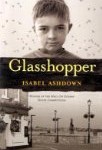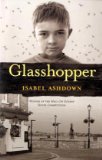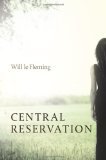Glasshopper by Isabel Ashdown
Five words from the blurb: family, turbulent, childhood, secrets, alcoholic
Glasshopper contains a dual narrative covering the childhood of a boy called Jake, growing up in 1980s Portsmouth, and that of his mother coming-of-age in the 1960s.
Jake’s childhood is a troubled one. His father has moved out and his mother is an alcoholic. The reasons for his mother’s alcoholism are slowly revealed over the course of the novel; as are Jake’s strength and resilience.
This is the perfect book for anyone wanting to reminisce about life in England. The tiny details about Texan bars and sherbet Flying Saucers had me smiling in recognition. The story itself was very ordinary, but Jake’s charm was hard to resist.
Unfortunately the 1960s section didn’t come alive in the same way. I’m not sure if this was because I wasn’t alive and so didn’t pick up on the little details or because they weren’t there in the first place.
The writing was reminiscent of Maggie O’Farrell, so anyone who loves her books is sure to enjoy this one.
Recommended to anyone who remembers 1980s England.

Central Reservation by Will le Flemming
Five words from the blurb: rural, England, twin, ghost, grief
Central Reservation is set in rural England during the foot and mouth outbreak of 2001. The central character is Holly, a teenage girl, who is followed everywhere by the ghost of her twin sister. The ghost is an unnerving presence, rather than the scary, malevolent kind that you normally find in novels and it can be seen as a metaphor for the grief that she carries around with her.
The book started off really well, with an intriguing first line:
On a grey Thursday morning Holly lay in bed, staring at the ceiling, and wished her sister would die. Five hours later her wish came true.
The first few chapters were equally gripping, with a particularly vivid description of a bus crash.
Unfortunately the middle section was a bit ordinary. Events was realistically described, but the quiet study of a family’s grief did nothing but leave me feeling faintly depressed. I know a lot of people love this type of story, but I suspect that because I am lucky enough not to have lost a close member of my family it didn’t resonate with me as much.
Luckily everything picked up towards the end and the foot and mouth aspect of the book was very well done. I remember travelling home during the outbreak and seeing (and especially smelling) the pyres of dead cattle everywhere. I hadn’t come across a book that covers the subject before, but I’m sure everyone will be moved by some of the scenes in this book.
The specific Englishness of this story means that it is unlikely to have universal appeal, but if you’re looking for an emotional read this is a good choice.
Recommended to those familiar with rural England.

.



20 replies on “Two Realistic Tales of English Life”
Glasshopper is on ym wish list but now I know it mentions Texans I may just click on that purchase button! I love Texans. I wonder if you can still get them anywhere. And I’m interested in Central Reservation too. Haven’t come across that before but we were up and down a lot to the Peak District at the time of foot and mouth before moving up permamnently and it had a huge impact here. I also remember those pyres and the smell.
Thanks for the recommendation about Glasshopper, it is set in my home city so it made me more intrigued. Went to look on Amazon and only 89p on Kindle, so easy decision really. Cannot wait to read it.
I’m not familiar with much about England, even though I did spend about 6 weeks there in the 90’s. But I have to say that the second book really looks interesting. I do love a book that introduces you to a part of the world you’ve never been.
I love how you’ve been grouping similar books together. When I want to immerse myself in Englishness, I shall read these.
I am looking hard for some non-crime books as I need to read something different. However, I did not like the two Maggie Farrells I read so I will probably give these a miss. I’ll keep trying, though! And I always have the Forsyte Saga to fall back on if I get really stuck.
That first line from Central Reservation sounds brilliant, but I’m not in the market for depressing books right now so I’ll leave it at that. Anyone looking to understand Englishness through non-fiction could do a lot worse than read Sir Roy Strong’s Visions of England. It largely by-passes politics – you will be pleased to hear, Jackie – instead, it traces English national identity through Protestantism, poetry and art, landscape and gardens. It is also a fairly short book, around 200 pages, and way more accessible than Peter Ackroyd’s dense and weighty foray into similar territory.
I loved Glasshopper. The sixties sections didn’t grab me as quickly as the eighties sections, but once I worked out the connections I was completely hookes. I’ve not come across Central Reservation before, but I will look out for it.
I don’t remember Texans which is strange because that’s where I ended up. I do remember flying saucers though.
I just finished reading The House on South Road by Joyce Storey, it mainly about growing up in England in the 1950s.
Ann